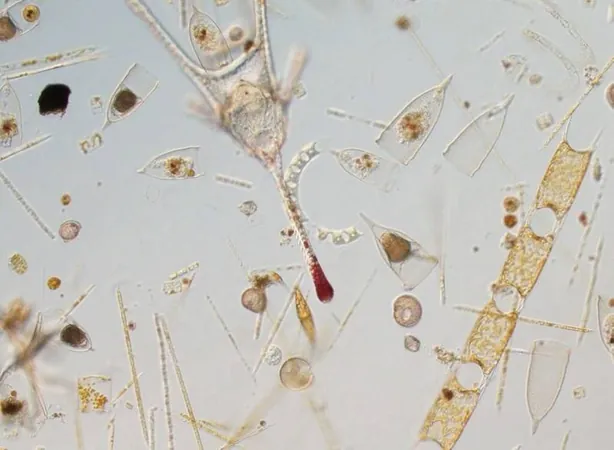
Why Upgrading Plankton Models Could Save Our Planet
2025-07-01
Author: Siti
Tiny Heroes of the Ocean: The Power of Plankton
You might be surprised to learn that the smallest organisms in our oceans—plankton—are actually the backbone of marine life and crucial players in the planet's health. A new study from the Plymouth Marine Laboratory (PML) makes a compelling case: it's high time we upgraded how we model these microscopic wonders to better understand our climate crisis.
The Importance of Accurate Plankton Modeling
According to a transformative paper published in the esteemed journal Nature Ecology & Evolution, led by Professor Kevin Flynn and a team of over 30 global experts, current models that simulate plankton's role in ocean ecosystems are outdated. These models are essential for everything from regional resource management to predicting climate change impacts, making their accuracy vital for our future.
Biodiversity: The Forgotten Key
"Without plankton, our oceans would be devoid of fish, sharks, and even whales. Their diversity is crucial, yet it's often oversimplified in models," cautions Flynn. Plankton are responsible for producing a significant portion of the world's oxygen and absorbing carbon dioxide—just like land plants. Their evolutionary impact is immense, and their role in mitigating climate change cannot be overstated.
Outdated Tools for a Changing World
The stark reality is that we're relying on models that are two to five decades old to understand rapidly evolving marine ecosystems—an alarming disconnect that could spell disaster for biodiversity and marine productivity. "We're getting the 'right' results for the wrong reasons," Flynn warns, highlighting the urgent need for more sophisticated models.
Call to Action: Revolutionizing Plankton Research
The authors of the new study are calling for a seismic shift in how we approach plankton modeling. Here are some pivotal recommendations:
Implementing Real-World Solutions
1. **Collaborative Efforts**: Encourage collaboration between empirical scientists and modelers during the development stages of simulation models. 2. **Realistic Complexities**: Integrate vital ecological complexities into the design of core models. 3. **Inclusive Tools**: Develop user-friendly tools that allow scientists with varying skill levels to participate in model creation. 4. **Invest in Innovation**: Channel investments into 'digital twin' platforms—state-of-the-art models that replicate biological processes, providing actionable insights amid global change.
A New Era in Plankton Research
Dr. Flynn emphasizes that we must reframe how we view modeling in plankton ecology, much like the pivotal shift molecular biology brought to science in the 1980s. This is a clarion call for scientists and policymakers alike: let’s ensure our modeling practices reflect the complexities of these essential organisms.
Supported by the UK's Natural Environment Research Council and aligned with the UN Decade of Ocean Science, this groundbreaking work aims to enhance our understanding of the ocean and inform decisions that affect both marine ecosystems and our planet's future.



 Brasil (PT)
Brasil (PT)
 Canada (EN)
Canada (EN)
 Chile (ES)
Chile (ES)
 Česko (CS)
Česko (CS)
 대한민국 (KO)
대한민국 (KO)
 España (ES)
España (ES)
 France (FR)
France (FR)
 Hong Kong (EN)
Hong Kong (EN)
 Italia (IT)
Italia (IT)
 日本 (JA)
日本 (JA)
 Magyarország (HU)
Magyarország (HU)
 Norge (NO)
Norge (NO)
 Polska (PL)
Polska (PL)
 Schweiz (DE)
Schweiz (DE)
 Singapore (EN)
Singapore (EN)
 Sverige (SV)
Sverige (SV)
 Suomi (FI)
Suomi (FI)
 Türkiye (TR)
Türkiye (TR)
 الإمارات العربية المتحدة (AR)
الإمارات العربية المتحدة (AR)